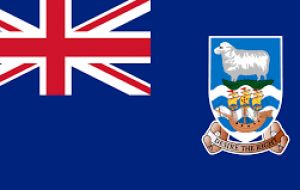MercoPress. South Atlantic News Agency
Falklands' Day, recalls when John Davis first sighted the Islands on 14 August 1592
 The date marks the first recorded sighting of the Falklands on 14 August 1592 by English explorer John Davis who captained the 120-ton vessel ‘Desire’
The date marks the first recorded sighting of the Falklands on 14 August 1592 by English explorer John Davis who captained the 120-ton vessel ‘Desire’  The Falklands’ coat of arms motto is precisely “Desire the right” in honor to Davis and includes an image of his vessel ‘Desire’.
The Falklands’ coat of arms motto is precisely “Desire the right” in honor to Davis and includes an image of his vessel ‘Desire’. Falklands Day is the celebration of the first sighting of the Falkland Islands by John Davis in 1592, and is commemorated on 14 August. It was once seen as the National Day of the Falklands but has largely been replaced by Liberation Day which commemorates the end of the Falklands War.
Falkland Day ceased be to a public holiday in 2002 when the Executive Council moved the holiday to provide for the re-introduction of Peat Cutting Monday, on the first Monday in October.
The date marks the first recorded sighting of the Falklands on 14 August 1592 by English explorer John Davis who captaining the 120-ton vessel ‘Desire’ in that month was blown by a storm into ‘certaine Isles never before discovered’. Davis account was published in 1600 in London by Richard Hakluyt.
The Falklands’ coat of arms motto is precisely “Desire the right” in honor to Davis and includes an image of his vessel ‘Desire’.
According to the brief history of the Falklands, Davis was followed by the English seaman Sir Richard Hawkins in 1594 and the Dutch explorer Sebald de Weert who visited in January 1600. The first recorded landing on the uninhabited islands took place on West Falkland on 27 January 1690, when the English sea captain John Strong came ashore.
For many years in the European continent the Falklands were known as the ‘Sebaldines’ in honor of the Dutch explorer Sebald de Weert.
Strong named the passage between the two Islands ‘Falkland’s Sound’ and Lord Falkland’s name later became attached to the entire main Islands group. In the early eighteenth century French sailors from the port of St Malo gave their name to ‘Les Iles Malouines’.
More than half a century later, in the 1760s, two settlements were established in East and West Falkland almost simultaneously by two different countries.
The French nobleman Louis Antoine de Bougainville, in a brief chapter of his remarkable life, landed settlers who had left Nova Scotia after the British conquest of French Canada at Port Louis in East Falkland in 1764.
In January 1765 Admiral Byron landed at Saunders Island north of West Falkland and claimed the isles for the crown of Great Britain. A second British expedition in 1766 returned to Saunders and named their settlement Port Egmont. They built houses and a prefabricated blockhouse and planted gardens.
Although British and French colonists became aware of each other’s activities relations were polite, helped no doubt by the distance between Port Louis and Saunders Island.
But in 1767 Bougainville was obliged to sell his settlement to the Spanish crown, which resented a foreign colony in what it considered its sphere of influence.
The Spaniards took over Port Louis which they named Puerto de la Soledad. Keen to assert their authority, a Spanish fleet arrived at Saunders Island in 1770 and obliged the small British garrison to leave. An international crisis followed, which was only resolved in 1771 when Spain agreed that the British settlement should be restored and three ships sailed out to re-establish British authority in September 1771.




Top Comments
Disclaimer & comment rules-

-

-

Read all commentsSergio Aracri
Aug 16th, 2019 - 12:21 pm +2“Me importa un comino lo que reconozcan o no los piratas. Plus Ultra. Uti possidetis.”
Your reiterating the same lying viveza criolla drivel.
https://en.mercopress.com/2019/08/09/argentina-must-not-be-deaf-to-falkland-islanders-voice-says-ex-deputy-foreign-minister/comments#comment503256
The only pirates came from Argentina “There is scarcely a Buenos Ayrean privateer which has not committed piracy of every description” John Quincy Adams July 20th, 1820
“One Argentine privateer was the Herotna, which sailed in 1820 commanded by an American called David Jewett. ... After consulting US Consul George Slacum, who had protested to no avail about Vernet's seizure of American ships, Captain Duncan sailed to the Falklands, and on 31 December 1831 took prisoner the seven men who had seized the three American ships”
Getting it right: the real history of the Falklands/Malvinas. by Graham Pascoe and Peter Pepper © 2008
Malvinense 1833
Aug 16th, 2019 - 05:17 pm +2“John Davis latitude” He found land, while your all at sea.
Serg - uti possidetis is not applicable and it is only a theory. Try taking it to a court.
Aug 16th, 2019 - 10:46 pm +2MoreCrap - only longitude was generally recognised as able to be determined with anything close to accuracy in 1592 and even that cannot be determined in a storm. There is no serious argument that Davis saw anything other than the Falklands and Hawkins followed up shortly after. According to Bougainville, the Spanish still did not know how to find the islands in 1767.
Commenting for this story is now closed.
If you have a Facebook account, become a fan and comment on our Facebook Page!